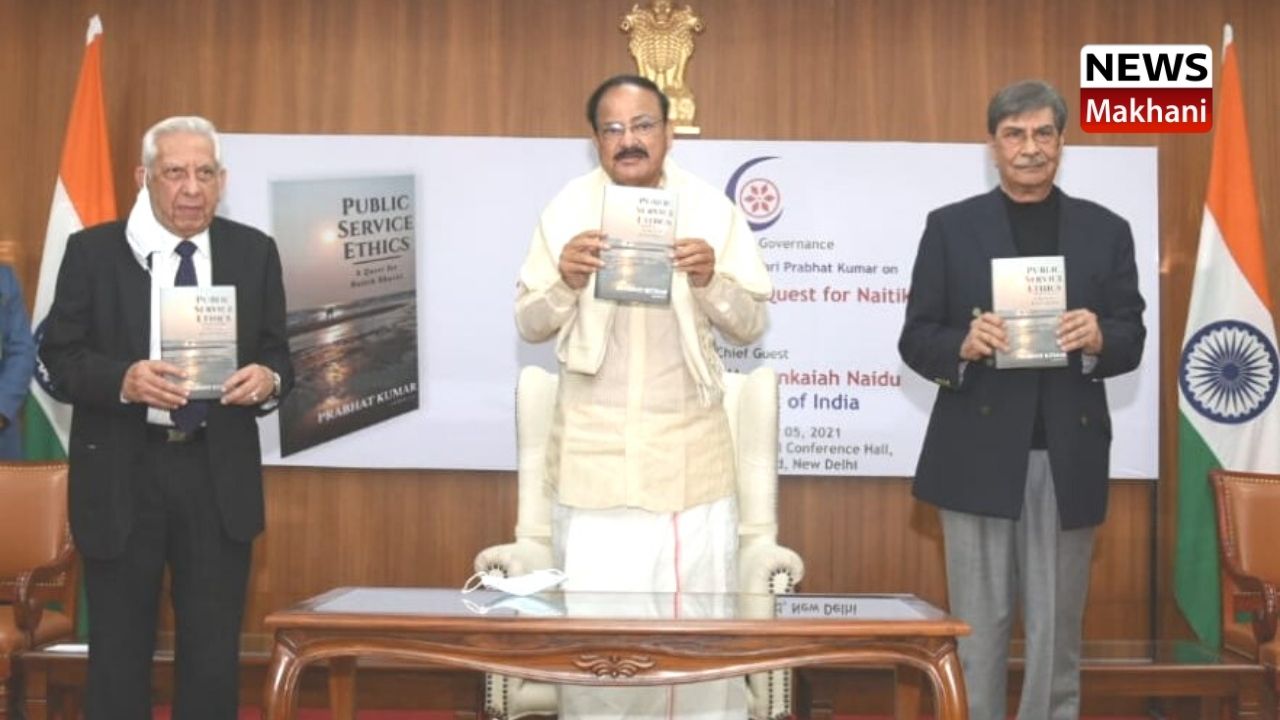
Show zero tolerance towards corruption, go for stringent implementation of Prevention of Corruption Act: VP
‘Celebrate honest civil servants; recognise younger officials striving towards excellence’: Shri Naidu’s advice to media
VP calls for value-based training to all civil servants, stresses need for a comprehensive Civil Services Code
Need for a broad-based social movement towards a ‘Naitik Bharat’: VP
Vice President releases book on ‘Public Service Ethics’ by Shri Prabhat Kumar
The Vice President, Shri M. Venkaiah Naidu, today called for a moral resurgence of civil services in the country to improve the delivery of services to the common man and to ensure the fruits of development reach the people.
READ MORE :-APEDA organized ‘Agri-export conference cum Buyer Seller Meet’ at Mirzapur
In this regard, he urged zero tolerance towards corruption and ensuring total transparency and accountability at all levels of governance. Noting that corruption eats into the heart of the democracy, he stressed the need for stringent and timely action under the Prevention of Corruption Act (PCA) against erring civil servants and public representatives. He called for fast-tracking the high pendency of cases related to corruption involving public servants on priority.
At the same time, Shri Naidu cautioned that civil servants taking bona fide proactive actions are not discouraged or harassed. “While corrupt civil servants must be strictly dealt with, we must not dissuade officials from taking bold decisions in the larger public interest”, he added.
The Vice President was speaking at the release of the book, ‘Public Service Ethics’ written by Shri Prabhat Kumar, former Governor of Jharkhand and former Cabinet Secretary to the Government of India, at Upa-Rashtrapati Nivas today. Shri Naidu observed that there is a general decline in the ethical values in society and called for a broad-based social movement for a ‘Naitik Bharat’ or ‘Ethical India’.
In this regard, Shri Naidu called for celebrating the achievements of honest civil servants and recognizing their contributions. This, he suggested, will not only be an incentive for younger officials to push for excellence, but such publicity will also encourage the replication of innovative efforts by others. He advised the media to highlight such contributions of local civil servants and encourage them.
Recalling his experience of working with enterprising civil servants, Shri Naidu noted that many young officers have been bringing innovation into their work, in programmes like Swachh Bharat.
Further, the Vice President also touched upon the importance of value-based training to all civil servants to ensure probity in public life. He said that professional ethics should be an integral component in all the training courses and called for a comprehensive Code of Ethics for civil servants, based on the recommendations of the 2nd Administrative Reforms Commission (ARC).
Enumerating the qualities of an ethical and public-spirited civil servant, the Vice President said an ideal officer should ensure zero pendency of issues in his purview, must display the highest qualities of probity and integrity in office, be proactive in taking the measures of the government to the people, and above all be sympathetic to the cause of marginalised sections.
Reflecting on the importance of ‘good institutions’ for ‘good governance’, Shri Naidu said there is a need to re-engineer our institutions and streamline the processes to cut down delays and ensure timely delivery of the services. He called for a greater use of IT to reduce human interface in services. Such processes will not only improve quality, but reduce discretion and conflict of interest of the serving officials, he noted.
The Vice President observed that governance models should change in line with the modern aspirations of our people, and that it is necessary to keep the bureaucratic system ‘light, transparent and agile’. He complimented the government for launching ‘Mission Karmayogi’ with an aim to build a citizen-centric and future-ready civil service for the nation.
Shri Naidu complimented the author of the book, Shri Prabhat Kumar and the publisher IC Centre for Governance for their efforts in bringing out the book. Appreciating Shri Kumar, he observed that there is a great scope for retired senior civil servants to share their rich experience and knowledge with young officers and contribute to the field of public policy.
Shri Prabhat Kumar, former Governor of Jharkhand and former Cabinet secretary, Shri Mahesh Kapoor, Vice-President, IC Centre of Governance, Shri Shanti Narain, Secretary General, IC Centre of Governance, serving and retired civil servants and others were present during the event.
Following is the full text of the speech:
“Sisters and brothers,
I am very happy to release the book ‘Public Service Ethics – A Quest for Naitik Bharat’ by Shri Prabhat Kumar published by IC Centre for Governance. As the former Governor of Jharkhand, and as an eminent civil servant who had served at the highest level as the Cabinet Secretary to the Government of India, Shri Prabhat Kumar has a rich experience of 50 years in public service. At the outset, my compliments to the author for his efforts in bringing out this book!
Sisters and brothers,
The topic chosen by Shri Prabhat Kumar is indeed very important and pertinent to public discourse. All over the world, there is a growing perception that ethical values are diminishing in society. Every profession in the economic, social and political arenas has experienced the ill-effects of the erosion of normative principles and values. Even in governance, there is a general decline in values and many instances of corruption.
The book deals with ethics in governance and public service and proposes a collective quest for ethical India or Naitik Bharat. It doesn’t just talk about the problems and the crisis of ethics – it gives practical and positive solutions and tells you how to head in the right direction.
The civil administration is a key fulcrum in our task of nation-building and the visionary former Deputy Prime Minister, Shri Sardar Vallabbhai Patel had rightly described it as the ‘steel frame of India’.
Indeed, India has seen many illustrious civil servants, who have gone beyond their call of duty and worked tirelessly for the development of the nation. Most recently, during the COVID-19, the civil servants rose to the occasion and worked with dedication to mitigate the hardship caused to the people. The doctors, scientists, farmers, policemen, sanitary workers and other frontline warriors served tirelessly to ensure that the essential services were unaffected.
Sisters and brothers,
As you all are aware, corruption eats into the heart of our democracy, weakening our institutions and adversely impacting the development of the nation. Public trust in the government too gets affected if funds earmarked for welfare measures get diverted. Thus, erosion of ethics in public life directly affects the biggest stakeholder, the common man.
We need to show zero-tolerance against corruption. Apart from the stringent implementation of the Prevention of Corruption Act (PCA) and fast-tracking cases against civil servants and public representatives, we have to ensure total transparency and accountability at all levels. The need of the hour is to eliminate human interface in the delivery of various services through robust use of Information Technology. At the same time, an effective grievance redress mechanism must be put in place.
In this process, due attention must be given to ensure that civil servants taking bona fide proactive actions are not discouraged or harassed. The amendment to PCA in 2018, with changes to the definition of ‘criminal misconduct’, ensures this to some extent. While the corrupt civil servants must be strictly dealt with, we must not dissuade officials from taking bold decisions in the larger public interest.
In fact, we must celebrate honest civil servants and recognize their innovations and contributions. This will not only be an incentive for younger officials to push for excellence, but such publicity will also encourage the replication of innovative efforts by others. The media too must highlight the contributions of such civil servants by recognizing local heroes in our midst.
Sisters and brothers,
While such initiatives will help in changing the mindset of the people and encouraging individuals to imbibe ethical values, we must realize that good governance ultimately thrives on good institutions. The author also makes a case for ‘Institutional Ethics’ in addition to individual ethics.
The first foundational step in ensuring probity in public life is to impart value-based training to all public servants. Professional ethics should be an integral component in all the training courses of a civil servant. In the same way, as per the recommendations of the 2nd Administrative Reforms Commission, we need to rethink our Conduct Rules and evolve a comprehensive Civil Service Code, based on strong foundational values such as integrity, honesty and objectivity.
There is also a need to re-engineer our institutions and streamline the processes to cut down delays and ensure timely delivery of the services. People must be at the centre of a just and effective governance system. Some of the governance practices that helped in delivering results are single-window interfaces, e-governance, m-governance, third party appraisals, direct benefit transfer and participatory governance, among others.
All these governance mechanisms ensure two things: One, they improve the quality of service delivery and improve the ease of living for people. Two, they intrinsically promote transparency and accountability in our processes, leaving less to the discretion of the serving officials. They do not give scope for any conflict of interest.
Thus, it is very pertinent to reshape our governance models in line with the modern aspirations of our people, while keeping the bureaucratic system light, transparent and agile. We need to fully implement the Prime Minister’s exhortation- ‘Minimum government – Maximum governance’.
In this regard, I must compliment the government for launching ‘Mission Karmayogi’ to enable the Indian civil servant to meet future challenges by making him more creative, constructive, and technology-enabled. The scheme also seeks to ensure a very high standard of conduct in public servants. In other words, it aims to build a citizen-centric and future-ready civil service for the nation. This is certainly the need of the hour and I hope this mission is pursued earnestly.
Finally, I wish to highlight that ethical conduct implies not just abiding to the letter of the law, but an unflinching adherence to our constitutional values too.
Sisters and brothers,
Indian civil servants should strive to make India’s civil services the best in the world. They need to come out with innovative ideas and solutions to deliver public services to the satisfaction of every citizen. At the same time, the right ecosystem should be created to ensure that they have a meaningful career and are able to fulfill their responsibilities without fear or favour.
Once again, I am very happy to release this book by Shri Prabhat Kumar. I understand that even after his long career with the government, he has remained active in various pursuits for good and ethical governance and has been the President of the IC Centre for Governance.
There is a great scope for retired senior civil servants to share their rich experience and knowledge with young officers and contribute to the field of public policy.
My compliments to the publishers, the IC Centre for Governance for their efforts in bringing out this book!
Sisters and brothers,
Finally, as the author suggests, going forward, we need a social movement for a ‘Naitik Bharat’. Such a movement for ethical action should encompass all walks of life- civil servants, public representatives, engineers, doctors, advocates, teachers and journalists, among others.
In fact, it is my fervent belief that orientation towards ethical conduct should be ingrained from an early age, right from school days. While teaching ethics and moral values to children, there can be no greater source of inspiration than Gandhiji himself.
One of the last notes left behind by Gandhiji in 1948, expressing his deepest social thought, is his Talisman. It is as follows:
“I will give you a talisman. Whenever you are in doubt, or when the self becomes too much with you, apply the following test. Recall the face of the poorest and the weakest man whom you may have seen, and ask yourself, if the step you contemplate is going to be of any use to him. Will it restore him to a control over his own life and destiny? In other words, will it lead to swaraj for the hungry and spiritually starving millions?
Then you will find your doubts melting away.”
It is amazing that this Talisman is more relevant today than ever, and what Gandhiji wrote can guide a civil servant or any responsible citizen, when faced with an ethical dilemma.
Keeping this in mind, let us strive together for a moral resurgence in every profession including education, health care, business, and industry and above all in the delivery of services to the common man.
Thank you. Namaskar.
Jai Hind.”

 हिंदी
हिंदी





